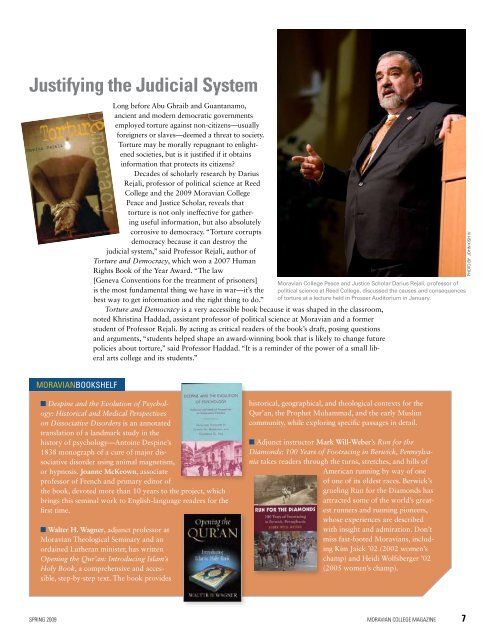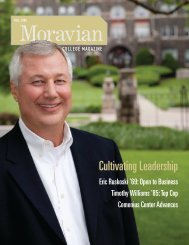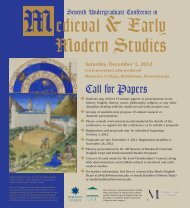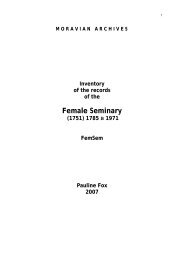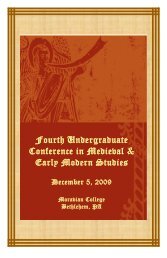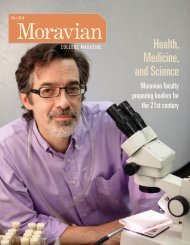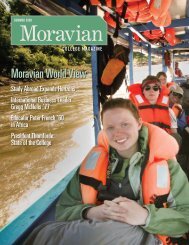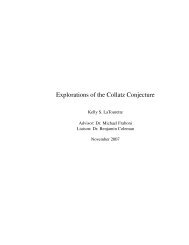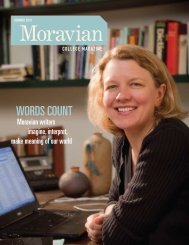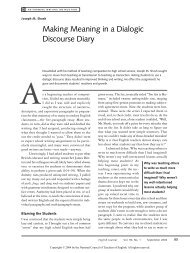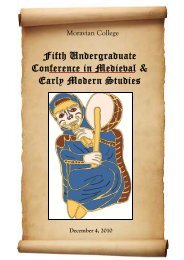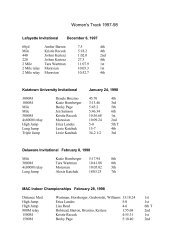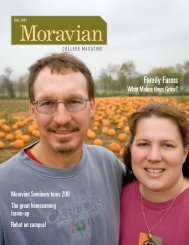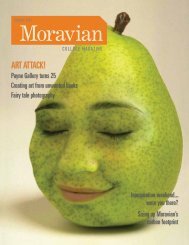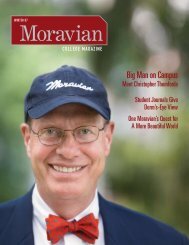Ahead of the Curve - Moravian College
Ahead of the Curve - Moravian College
Ahead of the Curve - Moravian College
You also want an ePaper? Increase the reach of your titles
YUMPU automatically turns print PDFs into web optimized ePapers that Google loves.
Justifying <strong>the</strong> Judicial System<br />
Long before Abu Ghraib and Guantanamo,<br />
ancient and modern democratic governments<br />
employed torture against non-citizens—usually<br />
foreigners or slaves—deemed a threat to society.<br />
Torture may be morally repugnant to enlightened<br />
societies, but is it justified if it obtains<br />
information that protects its citizens<br />
Decades <strong>of</strong> scholarly research by Darius<br />
Rejali, pr<strong>of</strong>essor <strong>of</strong> political science at Reed<br />
<strong>College</strong> and <strong>the</strong> 2009 <strong>Moravian</strong> <strong>College</strong><br />
Peace and Justice Scholar, reveals that<br />
torture is not only ineffective for ga<strong>the</strong>ring<br />
useful information, but also absolutely<br />
corrosive to democracy. “Torture corrupts<br />
democracy because it can destroy <strong>the</strong><br />
judicial system,” said Pr<strong>of</strong>essor Rejali, author <strong>of</strong><br />
Torture and Democracy, which won a 2007 Human<br />
Rights Book <strong>of</strong> <strong>the</strong> Year Award. “The law<br />
[Geneva Conventions for <strong>the</strong> treatment <strong>of</strong> prisoners] <strong>Moravian</strong> <strong>College</strong> Peace and Justice Scholar Darius Rejali, pr<strong>of</strong>essor <strong>of</strong><br />
is <strong>the</strong> most fundamental thing we have in war—it’s <strong>the</strong> political science at Reed <strong>College</strong>, discussed <strong>the</strong> causes and consequences<br />
best way to get information and <strong>the</strong> right thing to do.” <strong>of</strong> torture at a lecture held in Prosser Auditorium in January.<br />
Torture and Democracy is a very accessible book because it was shaped in <strong>the</strong> classroom,<br />
noted Khristina Haddad, assistant pr<strong>of</strong>essor <strong>of</strong> political science at <strong>Moravian</strong> and a former<br />
student <strong>of</strong> Pr<strong>of</strong>essor Rejali. By acting as critical readers <strong>of</strong> <strong>the</strong> book’s draft, posing questions<br />
and arguments, “students helped shape an award-winning book that is likely to change future<br />
policies about torture,” said Pr<strong>of</strong>essor Haddad. “It is a reminder <strong>of</strong> <strong>the</strong> power <strong>of</strong> a small liberal<br />
arts college and its students.”<br />
photo by john kish iv<br />
MORAVIANBOOKSHELF<br />
■ Despine and <strong>the</strong> Evolution <strong>of</strong> Psychology:<br />
Historical and Medical Perspectives<br />
on Dissociative Disorders is an annotated<br />
translation <strong>of</strong> a landmark study in <strong>the</strong><br />
history <strong>of</strong> psychology—Antoine Despine’s<br />
1838 monograph <strong>of</strong> a cure <strong>of</strong> major dissociative<br />
disorder using animal magnetism,<br />
or hypnosis. Joanne McKeown, associate<br />
pr<strong>of</strong>essor <strong>of</strong> French and primary editor <strong>of</strong><br />
<strong>the</strong> book, devoted more than 10 years to <strong>the</strong> project, which<br />
brings this seminal work to English-language readers for <strong>the</strong><br />
first time.<br />
■ Walter H. Wagner, adjunct pr<strong>of</strong>essor at<br />
<strong>Moravian</strong> Theological Seminary and an<br />
ordained Lu<strong>the</strong>ran minister, has written<br />
Opening <strong>the</strong> Qur’an: Introducing Islam’s<br />
Holy Book, a comprehensive and accessible,<br />
step-by-step text. The book provides<br />
historical, geographical, and <strong>the</strong>ological contexts for <strong>the</strong><br />
Qur’an, <strong>the</strong> Prophet Muhammad, and <strong>the</strong> early Muslim<br />
community, while exploring specific passages in detail.<br />
■ Adjunct instructor Mark Will-Weber’s Run for <strong>the</strong><br />
Diamonds: 100 Years <strong>of</strong> Footracing in Berwick, Pennsylvania<br />
takes readers through <strong>the</strong> turns, stretches, and hills <strong>of</strong><br />
American running by way <strong>of</strong> one<br />
<strong>of</strong> one <strong>of</strong> its oldest races. Berwick’s<br />
grueling Run for <strong>the</strong> Diamonds has<br />
attracted some <strong>of</strong> <strong>the</strong> world’s greatest<br />
runners and running pioneers,<br />
whose experiences are described<br />
with insight and admiration. Don’t<br />
miss fast-footed <strong>Moravian</strong>s, including<br />
Kim Jaick ’02 (2002 women’s<br />
champ) and Heidi Wolfsberger ’02<br />
(2005 women’s champ).<br />
SPRING 2009 MORAVIAN COLLEGE MAGAZINE 7


